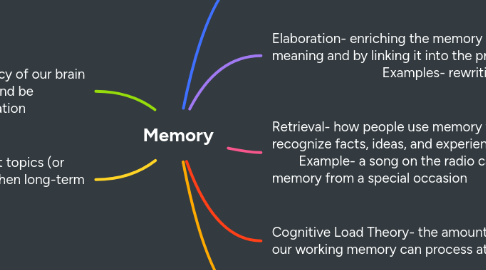Memory
저자: Raaed Abdul-Hameed

1. Concrete Memory- the tendency of our brain to better process, remember, and be influenced by concrete information
2. Interleaving- mixing different topics (or practice methods) to strengthen long-term memory of the material.
3. BDNF- Brain-Derived Neurotropic Factor
3.1. It is a type of protein that is active in many brain areas – including those that are vital to learning, memory, and higher thinking
4. Elaboration- enriching the memory representation of an item by activating many aspects of its meaning and by linking it into the pre-existing network of semantic associations Examples- rewriting, note-making, comparisons, and self-questioning
5. Retrieval- how people use memory to recall and recognize facts, ideas, and experiences Example- a song on the radio can trigger a memory from a special occasion
6. Cognitive Load Theory- the amount of information our working memory can process at any given time
7. Working Memory- the small amount of information that can be held in mind and used in the execution of cognitive tasks


